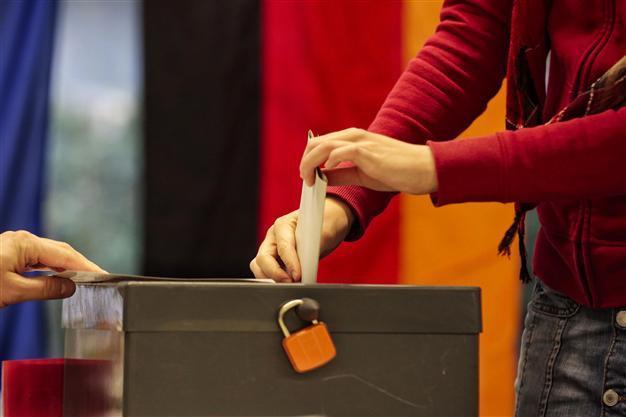Germany votes with Merkel set for third term
BERLIN - Agence France-Presse

A voter casts her ballot at a polling station in Berlin, Sunday, Sept. 22, 2013. AP photo
Germans voted Sunday in a closely watched election that is likely to hand Chancellor Angela Merkel a third term leading Europe's top economy but may force her to govern with her main rivals.After shepherding Germany through Europe's lengthy financial turmoil, Merkel has emerged more popular than ever, proving a safe pair of hands as the crisis felled leaders in France, Greece, Italy and Spain.
Polls suggest that voters will re-elect the 59-year-old pastor's daughter, whose nickname "Mutti" ("Mummy") can seem at odds with her other often-used description as the world's most powerful woman.
But the burning question is whether she will be able to keep her preferred coalition partner or be forced into an alliance with her centre-left rivals.
Under clear skies and mild temperatures, voters trickled into Merkel's local polling station in a historic central Berlin district where the former East German herself was later to cast her ballot.
"I think we have a good standard of living in Europe and for me, this must remain stable. So, to me, voting for the extremes, on the left or the right, isn't an answer," nun Elisabeth Bauer told AFP.
Maressa Kutscha, 26, admitted it had been a struggle to choose.
"I was extremely uncertain voting... because not much differentiates the parties," she said.
Nearly 62 million voters were called to the polls. Initial television estimates are expected shortly after booths close at 6:00 pm (1600 GMT).
"Rarely was it so close. Merkel's coalition only has a razor-thin majority in the polls," the Sueddeutsche Zeitung daily said Saturday, adding that many voters only make up their minds at the last minute.
Merkel boasts her current centre-right coalition has been Germany's most successful since reunification in 1990, enjoying a robust economy and a jobless rate of less than seven percent.
But her stated aim for her conservative Christian Democratic Union (CDU) to stay in power with its junior partners, the pro-business Free Democratic Party (FDP), hinges on the smaller party's unpredictable fortunes.
"The continued governing by this coalition remains uncertain," said Gero Neugebauer, a political scientist from Berlin's Free University.
If the alliance fails to secure a ruling majority, Merkel could be forced back into the arms of her traditional rivals, the Social Democrats (SPD), with whom she governed in a loveless "grand coalition" during her first 2005-2009 term. Under the watchful eye of Germany's European partners, a new eurosceptic party, the Alternative for Germany (AfD), could also prove a wild card, either by clawing enough support to send MPs into parliament or wooing away disgruntled centre-right voters.
"If the protest party manages to jump into the Bundestag (lower house of parliament), that may cost the black-yellow coalition power," Spiegel Online said, referring to the colour code for Merkel's current alliance.
Three opinion polls ahead of the elections showed the AfD, which advocates ditching the single currency and an "orderly dissolution" of the 17-member eurozone, falling below the five-percent hurdle needed to enter parliament.
But some analysts have not ruled it out amid fresh Greek aid fears, stressing it is hard to assess the fledgling party's chances because it has no election track record and supporters may not admit to backing it in surveys.
Merkel again hammered home Europe's importance for Germany at a last-ditch push for votes in Berlin Saturday.
"The stabilisation of the euro is not just a good thing for Europe but it is also in Germany's fundamental interest," she said.
Merkel's gaffe-prone opponent Peer Steinbrueck, 66, stumbled again recently with a surly middle-finger front-page photo of him as a non-verbal reply to a question on his limping candidacy. Dressed in his signature red tie -- his party's colours -- the former finance minister in Merkel's 2005-2009 coalition, voted with his wife in his western home city of Bonn.
"Today is election day. It's in your hands. Please go vote," he tweeted earlier.
Steinbrueck has zeroed in on a growing low-wage sector and calls for a national minimum wage but his SPD party still trailed the conservative bloc by 13 points in the last opinion poll.
Wrapping up campaigning, he urged voters to remove "the most inactive government that has made the least progress" in over two decades and mocked the famously ideologically flexible Merkel for "going round and round". Analysts say no major U-turns in economic policy are expected if a left-right alliance emerges from the election, including on Germany's policy on Europe where the opposition has backed Merkel on key anti-crisis moves.
Bild newspaper Sunday said that whoever won faced some big problems, first of which was the ongoing euro crisis.
"The winner takes it all -- all the troubles, too," it added.
















